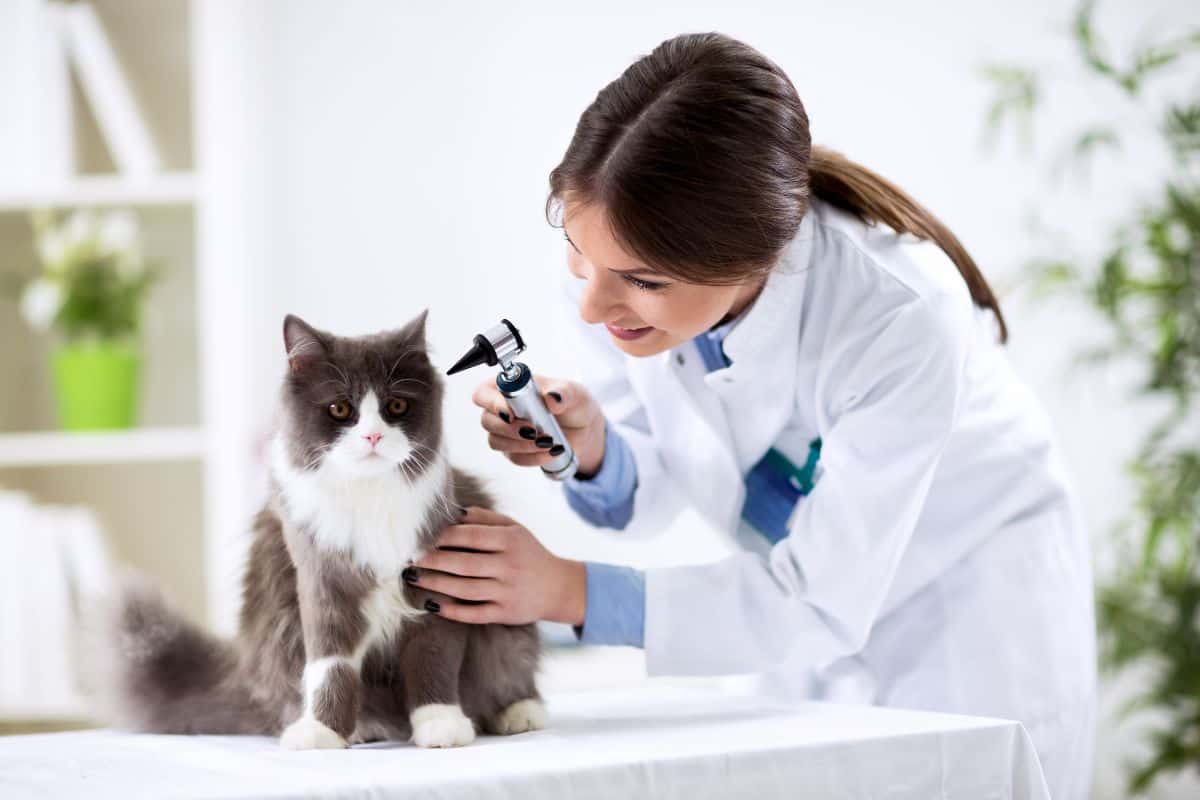Veterinary Oncology Services overview for pet owners facing cancer diagnoses
Comprehensive Overview to the Solutions Offered by a Vet Oncologist
Veterinary oncology incorporates a broad array of solutions focused on detecting and treating cancer in family pets. Veterinary Oncologist. Oncologists use advanced analysis techniques and supply various therapy options customized to each pet's demands. They likewise focus on supportive treatment and provide useful sources for animal proprietors. Recognizing these solutions is vital for making educated decisions. What certain aspects of veterinary oncology can especially impact a family pet's therapy journey?
Comprehending Vet Oncology
Vet oncology is a specialized field concentrated on diagnosing and treating cancer in animals. This self-control incorporates a variety of strategies, from medical treatments such as chemotherapy and immunotherapy to medical treatments intended at removing growths. Veterinary oncologists are educated to identify the one-of-a-kind manifestations of cancer in different types, allowing them to customize therapy strategies to specific patients.
Along with traditional treatments, veterinary oncology highlights helpful treatment, which plays a crucial duty in enhancing the lifestyle for affected animals. This includes pain management, nutritional support, and palliative care alternatives. Collaboration with pet owners is crucial, as they are integral to decision-making regarding their pets' treatment courses. As study breakthroughs, vet oncology proceeds to advance, supplying brand-new hope and enhanced results for animals diagnosed with cancer. On the whole, this area is basic for attending to the complexities of cancer in friend pets.
Advanced Diagnostic Techniques
Advanced diagnostic techniques play an important role in vet oncology, supplying vital insights right into the visibility and degree of cancer in pets. Imaging techniques such as ultrasound, CT scans, and MRI are typically employed to envision growths and evaluate their characteristics. In addition, biopsy treatments are necessary for obtaining tissue examples, enabling for definitive medical diagnosis and tailored therapy plans.
Imaging Modalities Utilized
Imaging methods play a necessary function in the medical diagnosis and administration of cancer in pets. Veterinary oncologists use various innovative imaging techniques to analyze growth existence, transition, and size. Radiography, or X-rays, offers an initial sight of bone and breast problems, while ultrasound provides real-time imaging of soft tissues, enabling detailed examination of interior body organs. Computed tomography (CT) boosts visualization of complex anatomical structures and enables 3D reconstructions, helping in specific growth localization. Magnetic vibration imaging (MRI) is vital for soft cells differentiation, especially in mind tumors. Furthermore, nuclear medication strategies such as positron emission tomography (ANIMAL) assistance recognize metabolic activity within tumors. Collectively, these techniques boost analysis accuracy, guiding efficient therapy approaches for oncological patients.
Biopsy Procedures Discussed
Complying with the first analysis via imaging modalities, obtaining a conclusive diagnosis commonly calls for cells tasting via biopsy treatments. Vet oncologists make use of various biopsy techniques based on the tumor's area and features. Great needle goal (FNA) is a minimally intrusive approach that removes cells for cytological exam, perfect for surface masses. Core needle biopsies give bigger cells examples and serve for much deeper growths, permitting histopathological analysis. Surgical biopsies involve excising a portion or the whole lump, promoting thorough evaluation. These treatments not just verify the existence of cancer yet additionally assist identify its type and quality, assisting treatment decisions. Each biopsy approach is picked very carefully to balance diagnostic precision with individual safety and comfort.
Therapy Options for Cancer Cells in Animals
When a pet is detected with cancer cells, a variety of therapy options come to be offered to aid handle the condition and improve quality of life. Veterinary oncologists typically suggest a multidisciplinary approach tailored to the specific pet's requirements, which might include surgery, radiation therapy, immunotherapy, or alternate therapies.
Surgical treatment is usually used to get rid of growths and affected cells, potentially resulting in full remission in some situations. Radiation therapy intends to target and ruin cancer cells, minimizing tumor dimension and minimizing symptoms - Veterinary Cancer Specialist. Immunotherapy uses the animal's body immune system to battle cancer cells much more properly, while alternative treatments may consist of acupuncture or herbal supplements to sustain total health
Each treatment alternative lugs its very own benefits and risks, and vet oncologists work carefully with pet dog proprietors to develop a comprehensive plan that lines up with the family pet's particular medical diagnosis and the proprietor's wishes. The utmost goal is to boost the animal's convenience and high quality of life throughout their cancer cells journey.
Radiation treatment for Pets
Chemotherapy is a typical therapy choice for family pets detected with cancer cells and is typically used along with other treatments laid out by vet oncologists. This therapy includes the administration of particular medications designed to target and destroy cancer cells, thereby lowering growth dimension and preventing the spread of the condition. Veterinary oncologists customize radiation treatment procedures based upon the kind of cancer cells, the family pet's general health and wellness, and the desired treatment end result.
Side impacts can occur, as these medicines might additionally influence healthy cells. Common responses include queasiness, vomiting, and temporary adjustments in appetite - Veterinary Cancer Specialist. Veterinary oncologists are equipped to handle these side impacts properly, making certain the animal's comfort throughout the treatment process. Normal monitoring with blood tests and follow-up visits is vital to assess the family pet's reaction to chemotherapy and make required modifications. Ultimately, radiation treatment can provide considerable benefits, boosting the lifestyle for animals encountering cancer medical diagnoses

Radiation Treatment in Veterinary Medicine
Radiation treatment acts as an effective therapy option for pet dogs identified with local growths, using a targeted approach to cancer cells administration. This strategy uses high-energy radiation to damage the DNA of cancer cells, inhibiting their ability to multiply. It is especially valuable for growths that are not responsive to medical removal or for situations where surgery might not be feasible due to the lump's location.
Veterinary oncologists tailor radiation methods based on tumor size, place, and type, as well as the family pet's overall health and wellness. Treatment can be supplied via outside beam of light radiation or brachytherapy, each with unique benefits. Normally, multiple sessions are called for to optimize efficiency while lessening adverse effects.
Although family pets may experience momentary responses such as skin irritation, the overall purpose is to diminish tumors and minimize signs and symptoms, eventually enhancing the pet dog's diagnosis and quality of life. As necessary, radiation treatment plays a vital role in detailed cancer care.
Palliative Care and Lifestyle
Palliative treatment in vet oncology concentrates on improving the lifestyle for pet dogs encountering incurable health problems, making sure convenience and self-respect in their last days. This specific strategy prioritizes pain monitoring, sign control, and emotional support. Veterinary oncologists analyze each family pet's private needs, customizing interventions to ease discomfort and improve total wellness.
Techniques may include administering medicines for pain alleviation, handling queasiness, and resolving other upsetting signs. Additionally, nutritional support is often given to keep official site toughness and improve appetite. The psychological element of palliative treatment is similarly important; developing a calm environment aids decrease anxiety for both pet dog and owner.
Ultimately, the objective of palliative care is to permit animals to appreciate their staying time with as much joy and dignity as feasible. By concentrating on convenience and high quality of life, vet oncologists play a necessary role in making certain that animals and their family members navigate this difficult trip with compassion and understanding.
Support for Pet Dog Owners During Therapy

Emotional Advice for Owners
Charting the psychological landscape during a pet dog's cancer therapy can be an overwhelming experience for proprietors. The uncertainty bordering medical diagnosis and prognosis can bring about sensations of despair, helplessness, and stress and anxiety. Vet oncologists recognize the value of psychological support and commonly provide assistance to aid proprietors navigate this challenging trip. Interaction is important; going over therapy options and potential results can relieve some fears. Furthermore, using confidence that psychological responses are valid fosters a helpful atmosphere. Several oncology facilities may also suggest support groups or counseling services tailored for family pet proprietors, promoting common experiences. Urging proprietors to focus on self-care throughout this moment is vital, as their emotional well-being directly affects their pet browse around this site dog's convenience and total therapy experience.

Resources and Educational Materials
Steering via the intricacies of a family pet's cancer therapy can be intimidating for owners, making access to dependable sources and instructional materials important. Vet oncologists commonly offer a range of handouts, sales brochures, and online materials that explain therapy choices, potential adverse effects, and care strategies. These sources help equip and demystify the procedure animal proprietors to make educated choices. Furthermore, many oncology centers offer accessibility to support teams and forums where proprietors can get in touch with others encountering similar difficulties, fostering a feeling of community. Educational workshops and webinars conducted by vet professionals additionally enhance understanding, making certain that owners are fully equipped to browse their animal's trip via cancer cells therapy with confidence and expertise.
Regularly Asked Questions
Just How Can I Prepare My Pet Dog for a Veterinary Oncology See?
Preparing a pet for a vet oncology see entails event medical documents, noting signs and symptoms, and making certain the pet dog is comfortable. A calm temperament and acquainted items can aid ease anxiety during the consultation.
What Are the Indicators My Pet May Have Cancer?
Indications that a pet dog may have cancer cells include inexplicable weight-loss, relentless throwing up or looseness of the bowels, uncommon swellings or swellings, sleepiness, changes in appetite, difficulty breathing, and modifications in habits. Trigger veterinary interest is crucial.
Just How Can I Assistance My Pet Dog Emotionally Throughout Therapy?
Sustaining a pet dog psychologically throughout therapy entails giving convenience, preserving routines, providing gentle affection, and guaranteeing a calm environment. Participating in silent play and routine companionship helps reduce stress and fosters a complacency.
Exist Alternate Therapies for Animals With Cancer cells?
Different treatments for animals with cancer consist more tips here of acupuncture, natural treatments, and dietary assistance. These methods might enhance traditional treatments, advertising general well-being. Consulting with a vet is necessary for risk-free and effective assimilation of alternate therapies.
What Prices Should I Anticipate for Vet Oncology Solutions?
The anticipated prices for veterinary oncology solutions can vary considerably, usually influenced by diagnostics, therapies, and continuous treatment. Family pet owners must prepare for expenditures ranging from appointments to specialized therapies, mirroring the complexity of cancer cells management.
Cooperation with pet proprietors is important, as they are indispensable to decision-making regarding their family pets' treatment paths. Each treatment alternative brings its very own benefits and dangers, and vet oncologists work very closely with pet proprietors to design a complete plan that lines up with the pet dog's particular medical diagnosis and the proprietor's wishes. Family pets might experience short-term responses such as skin irritability, the overall goal is to reduce tumors and minimize signs and symptoms, ultimately improving the family pet's diagnosis and top quality of life. Support for animal proprietors throughout therapy is vital in steering with the psychological obstacles linked with a pet's cancer diagnosis. Preparing a family pet for a vet oncology browse through involves gathering medical records, noting signs, and making sure the family pet is comfy.